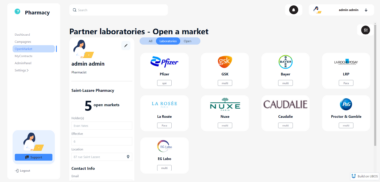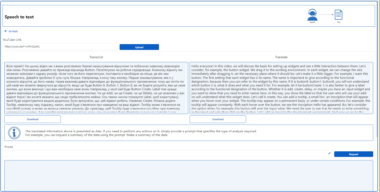Unreal-Blender MCP
Unreal-Blender MCP is a unified server for controlling both Blender and Unreal Engine via AI agents using the MCP (Machine Control Protocol) approach.
Overview
This project extends the blender-mcp framework to include support for Unreal Engine, allowing AI agents like Claude and ChatGPT to simultaneously control both platforms through a single interface.
Submodule Information
This project includes blender-mcp as a Git submodule. When cloning the repository, use the following commands:
# Clone with submodules
git clone --recursive https://github.com/tahooki/unreal-blender-mcp.git
# Or clone normally and then initialize submodules
git clone https://github.com/tahooki/unreal-blender-mcp.git
cd unreal-blender-mcp
git submodule update --init --recursive
Features
- Unified Control: Single MCP server to control both Blender and Unreal Engine
- AI Agent Integration: Designed to work with Claude, ChatGPT, and other AI assistants
- Blender Features: Retains all blender-mcp functionality including:
- Scene manipulation
- Object creation and editing
- Material management
- PolyHaven asset integration
- Hyper3D Rodin model generation
- Unreal Engine Features:
- Level creation and management
- Asset importing
- Python code execution
- Scene manipulation
- Extension Structure: Easily extend both Blender addon and server while maintaining compatibility with upstream updates
Architecture
The system consists of three main components:
- MCP Server: Central hub communicating with AI agents via SSE (Server-Sent Events) on port 8000
- Blender Addon: Socket server within Blender on port 8400 (standard) or 8401 (extended)
- Unreal Plugin: HTTP server within Unreal Engine on port 8500
[AI Agent] <--SSE--> [MCP Server (8300)]
|
|--HTTP--> [Blender Addon (8400)]
|
|--HTTP--> [Unreal Plugin (8500)]
Extension Structure
This project uses an extension approach to maintain compatibility with upstream changes:
- Blender Addon Extension: Extends the original
BlenderMCPServerwhile keeping the original code intact - Server Extension: Enhances the original server with additional tools and Unreal Engine integration
- Interface Tools: Provides utilities for installing, configuring, and running extensions
This approach allows easy updates from the original projects without code conflicts.
Step-by-Step Installation and Setup Guide
Prerequisites
- Python 3.10 or later
- Blender 3.0 or later
- Unreal Engine 5.0 or later
- uv package manager (install with
pip install uvif you don’t have it)
1. Clone the Repository
# Clone with submodules (recommended)
git clone --recursive https://github.com/tahooki/unreal-blender-mcp.git
cd unreal-blender-mcp
# Or if you already cloned without --recursive:
git clone https://github.com/tahooki/unreal-blender-mcp.git
cd unreal-blender-mcp
git submodule update --init --recursive
2. Set Up Python Environment
# Create a virtual environment and activate it
uv venv
# On Windows:
.venvScriptsactivate
# On macOS/Linux:
source venv/bin/activate
# Install project dependencies
uv pip install -e .
3. Install Blender Addon
Choose ONE of the following options:
Option A: Standard Addon (Original blender-mcp)
- Open Blender
- Navigate to Edit > Preferences > Add-ons
- Click “Install…” button
- Browse and select
blender-mcp/addon.pyfile - Enable the “Interface: Blender MCP” addon (check the box)
Option B: Extended Addon (With additional features)
- Run the extension installer script:
python -c "from src.unreal_blender_mcp.blender_addon import BlenderAddonManager; BlenderAddonManager().install_to_blender(force=True)" - Open Blender
- Navigate to Edit > Preferences > Add-ons
- Find and enable the “Interface: Extended Blender MCP” addon (check the box)
4. Install Unreal Engine Plugin
- Locate the
UEPythonServerfolder in this project - Copy the entire folder to your Unreal project’s
Pluginsdirectory- If your project doesn’t have a
Pluginsdirectory, create one
- If your project doesn’t have a
- Start Unreal Engine with your project
- Navigate to Edit > Plugins in the menu
- Find and enable the Python Server plugin
- Restart Unreal Engine when prompted
5. Start the MCP Server
Choose ONE of the following options:
Option A: Standard Server
# Make sure your virtual environment is activated
python main.py
Option B: Extended Server (More features)
# Make sure your virtual environment is activated
python run_extended_server.py
# Optional: Customize server options
python run_extended_server.py --host 127.0.0.1 --port 8080 --log-level DEBUG
6. Enable the Blender Server Connection
- Start Blender (if not already running)
- In the 3D viewport, press
Nto open the sidebar panel - Select the appropriate tab:
- “BlenderMCP” (if using standard addon)
- “ExtBlenderMCP” (if using extended addon)
- Click the “Start Server” button
- Verify the server starts successfully (check console output)
7. Verify Unreal Engine Connection
- With Unreal Engine running and plugin enabled
- The Python server should automatically start
- Check the Output Log (Window > Developer Tools > Output Log) for any messages
- The Unreal plugin should now be ready to receive commands
8. Connect an AI Agent
Option A: Integrate with Claude for Desktop
Add the following to Claude for Desktop’s configuration:
{
"mcpServers": {
"unreal-blender": {
"command": "uvx",
"args": [
"unreal-blender-mcp"
]
},
"unreal-blender-ext": {
"command": "python",
"args": [
"/path/to/unreal-blender-mcp/run_extended_server.py"
]
}
}
}
Replace /path/to/ with your actual project path.
Option B: Integrate with Cursor
Open Cursor Settings
Navigate to MCP section
Add the following commands:
- Standard Server:
uvx unreal-blender-mcp - Extended Server:
python /path/to/unreal-blender-mcp/run_extended_server.py
Replace
/path/to/with your actual project path.- Standard Server:
Option C: Integrate with Other AI Tools
Refer to your AI tool’s documentation for integrating with MCP servers, and point it to:
- MCP Server URL:
http://localhost:8000(or custom port if specified)
9. Testing the System
Once all components are running:
Use your AI agent to interact with Blender by asking it to:
- Create a simple cube or sphere
- Modify object properties
- Create materials
Use your AI agent to interact with Unreal Engine by asking it to:
- Create a new level
- Place assets
- Modify scene properties
Try more complex operations that involve both platforms working together
Troubleshooting
If you encounter issues:
- Check that all servers are running (MCP, Blender, Unreal)
- Verify port configurations match (default: 8000 for MCP, 8400/8401 for Blender, 8500 for Unreal)
- Check console outputs for error messages
- Restart components in the correct order: MCP server first, then Blender, then Unreal Engine
For more detailed information on development and extending the system, see the Project Document and workflow directory.
Comparison: Standard vs Extended
| Feature | Standard Server | Extended Server |
|---|---|---|
| Blender Control |  |  |
| Unreal Control |  |  |
| Custom Blender Commands |  |  |
| Enhanced Scene Info |  |  |
| Auto Feature Detection |  |  |
| Upstream Compatibility |  |  |
Choose the standard server for basic functionality or the extended server for advanced features.
Development
See the Project Document and workflow directory for detailed development information.
For extending this project:
- To add new Blender addon features: Modify
src/unreal_blender_mcp/blender_addon/extended_addon.py - To add new server tools: Modify
src/unreal_blender_mcp/server_extension/extended_server.py
License
This project is licensed under the MIT License - see the LICENSE file for details.
Acknowledgements
- This project builds upon blender-mcp by Siddharth Ahuja.
Future Developments
The following improvements are planned for future releases:
Structured Unreal Engine API
Currently, the Unreal Engine communication relies primarily on direct Python code execution. A planned enhancement is to implement a structured API similar to the Blender integration:
- Create predefined functions for common Unreal Engine operations
- Implement proper error handling and validation
- Improve security by limiting execution scope
- Enhance stability and predictability of operations
- Maintain backward compatibility while adding structure
This enhancement will create a more consistent experience across both engines and improve the overall reliability of the system. See the workflow documentation for more details on this planned development.
Ureanl-Blender-MCP
Project Details
- tahooki/unreal-blender-mcp
- Last Updated: 4/10/2025
Recomended MCP Servers

Example node MCP server. When a user asks the agent for the passphrase, a special code phase is...

X/Twitter MCP server

MCP server

bluetooth-mcp-server for Claude AI

A MCP‑like server using the DeepSeek API for Terminal

MCP server to run MATLAB code from LLM via the Matlab Engine API.



A Model-Context Protocol Server for YouTube

R MCP Server

MCP server for eSignatures (https://esignatures.com)
 From vibe coding to vibe deployment. UBOS MCP turns ideas into infra with one message.
From vibe coding to vibe deployment. UBOS MCP turns ideas into infra with one message.






